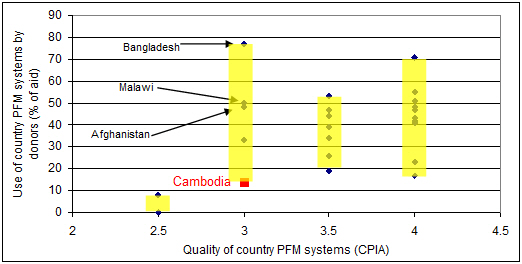|
A Briefing Note by CRDB/CDC January 2011
This note has been prepared to inform the preparation of a national workshop on country systems to be held in May 2011.
Defining country systems In the Cambodia context, country systems include the institutional procedures, mechanisms and arrangements for formulating policies and supporting their implementation through planning, budgeting, execution, procurement, reporting, accounting, monitoring and auditing. Beyond these core systems are also more specialized functions, such as social or environmental impact assessments, and management/administrative systems (e.g. human resource management).[1].
The rationale for strengthening and using country systems Current mechanisms and arrangements for project implementation, including the use of parallel project implementation units (PIUs), may fragment capacity and by-pass or undermine national systems. These approaches are perhaps not the most viable means to develop the public sector in the long-term. The Royal Government of Cambodia therefore emphasises the capacity development role of external assistance.[2] The effort to strengthen country systems and to increase their use by development partners is linked to the effort of the RGC's reform and sectoral programmes to develop sustainable capacity for developing, implementing and monitoring RGC policies in an accountable manner.
The commitment to using country systems RGC and its development partners have made a formal commitment to strengthening and using country systems. At country level, the Harmonisation, Alignment and Results Action Plan identified this priority, which was endorsed by signatory partners to the "Declaration by the Royal Government of Cambodia and Development Partners on Enhancing Aid Effectiveness in Cambodia" (October 2006). Dialogue at the CDCF meetings has emphasised the importance of strengthening country systems in the context of the RGC reform and sector programmes in order to support the sustainability and effectiveness of external assistance.
At the global level, the Paris Declaration and Accra Agenda for Action included formal commitments to strengthen country systems. The successor agreement of the Paris Declaration, to be formulated in South Korea in late-2011, is expected to continue to emphasise the importance of strengthening and using country systems.
Progress in Cambodia There has been strong ownership and development partner support for the RGC core reform programmes. There has also been significant investment in sector-focused Technical Cooperation and capacity development initiatives.[3] The use of country systems, however, has remained very low; the 2006 and 2008 Paris Declaration monitoring surveys recorded, respectively, only 10% and 12% of ODA as using RGC budget, reporting and audit systems. Progress since 2008 is not thought to have been significant.
In 2010 a study – "National Structures and Systems for Aid Implementation in Cambodia" – was commissioned by the development partners of the European Union, in coordination with the Partnership and Harmonisation TWG. The study, seen as a first step towards an assessment of country systems, found that
Cross-country experience It is instructive to briefly compare the experience in Cambodia with that of other countries. It may be expected, for example, that, as systems are assessed as stronger, DP use of them will increase. Comparing CPIA assessments of PFM systems and the use of those systems by DPs, however, shows that the relationship is weak:[4]
Empirical data suggests that the DP decision to use country systems may not be closely associated with the quality of those systems.
Use of country systems –
does quality matter? source: Paris Declaration monitoring survey 2008
Of all countries receiving a 3.0 CPIA rating of PFM systems in 2008, use of country systems by DPs is lowest in Cambodia (Afghanistan 48%, Malawi 50%, Bangladesh 77%).[5] This suggests some scope for making progress, including by learning from the experience of other countries. Given the diversity within the range of each single CPIA rating it is instructive to examine more closely the data within the range that includes Cambodia (i.e. a CPIA score of 3.0). Two issues are of particular interest:
|
